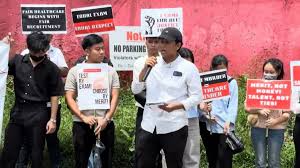
Nagaland Medical Students Continue Protest Against Regularisation of COVID Appointees

 :
| Updated On: 01-Sep-2025 @ 11:40 am
:
| Updated On: 01-Sep-2025 @ 11:40 amSHARE
The Nagaland Medical Students’ Association (NMSA) has reaffirmed its decision to continue with a peaceful protest scheduled for September 1, in response to the Nagaland state government’s decision to regularise 280 contractual employees who had been appointed during the COVID-19 pandemic. The association has strongly opposed this move, arguing that such regularisation undermines the principles of fairness, transparency, and merit in government recruitment processes.
The protest is being held in direct response to a notification issued by the Department of Health & Family Welfare on August 18, 2024, which confirmed the state government’s decision to absorb these contractual employees into the system on a permanent basis. According to the NMSA, while the contributions of health workers during the pandemic are acknowledged, the decision to regularise their services without following due recruitment processes is discriminatory against other qualified candidates who have been waiting for fair opportunities through competitive exams.
As per the protest plan, the students will gather at 9:30 AM at the Secretariat Bus Stand in Kohima. From there, they will march in a peaceful procession to the premises of the Department of Health & Family Welfare, where the main demonstration will be held. This act of public mobilisation is intended to draw attention to the pressing issue of recruitment fairness and to highlight the students’ demands before the state authorities.
In its public appeal, the NMSA has called upon all student bodies, civil society organisations, and concerned citizens of Nagaland to join hands with them in solidarity. They have also invited various organisations to send representatives who can deliver solidarity speeches at the protest site, further amplifying the collective voice against what they describe as a fundamentally unjust policy.
The association has clearly articulated two primary demands:
-
Immediate revocation of the notification issued on August 18 (Notification No. HFW(A)10/34/2024/145), which authorised the regularisation of contractual appointees.
-
Immediate requisitioning of all sanctioned posts to the Nagaland Public Service Commission (NPSC) and the Nagaland Staff Selection Board (NSSB), so that these posts can be filled transparently through open advertisement, written examination, and viva voce in accordance with established service rules.
The NMSA emphasised that their protest is not simply about protecting the interests of medical students but is fundamentally about safeguarding the values of justice, merit, equal opportunity, and transparency in government recruitment across Nagaland. They stressed that such arbitrary decisions by the government could set a dangerous precedent, denying rightful opportunities to deserving candidates who depend on competitive exams for government service entry.
In a strongly worded appeal, the NMSA described the government’s policy as both “unjust and discriminatory.” They urged the wider community to view this issue as a matter of principle, not just as a sectional concern. According to the association, the integrity of the recruitment system is at stake, and if citizens fail to speak up now, it may lead to long-term erosion of fairness in public service appointments.
Concluding their statement, the association declared: “It is now or never. Let us raise our voices together against this unjust and discriminatory policy.” By framing the issue as a collective battle for justice and equality, the NMSA hopes to inspire a broad coalition of supporters to stand with them during the September 1 protest and pressure the government to reverse its decision.